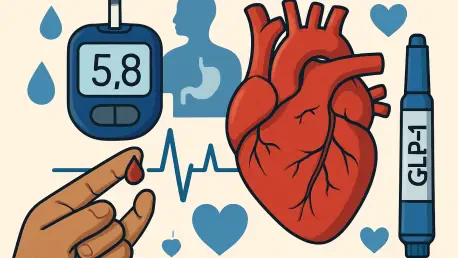What if a simple combination of daily choices and modern medicine could halve the risk of heart attacks for millions living with Type 2 diabetes? Across the United States, where this condition affects over 30 million people, cardiovascular disease remains the leading cause of death for those diagnosed. A groundbreaking study unveiled at a major health conference this year has sparked hope, showing that pairing healthy lifestyle habits with cutting-edge GLP-1 receptor agonist (GLP-1 RA) drugs can dramatically slash these deadly risks. This powerful synergy offers not just numbers on a chart, but a real chance at longer, healthier lives for those battling this chronic illness.
The Stakes Couldn’t Be Higher
For individuals with Type 2 diabetes, the heart is often the silent battleground. Statistics paint a grim picture: those with this condition face double the risk of cardiovascular death compared to their peers without diabetes. Major adverse cardiovascular events (MACE)—think heart attacks, strokes, and related fatalities—are not just possibilities but leading threats. Public health campaigns like the “Know Diabetes by Heart” initiative, backed by prominent medical associations, underscore this urgent crisis, pushing for solutions that address both the disease and its deadly complications. This is why emerging research on lifestyle and medication combinations isn’t just academic—it’s a lifeline.
A Deadly Link Under the Microscope
Delving deeper into the diabetes-heart health connection reveals a public health challenge of staggering scale. Over recent years, the prevalence of Type 2 diabetes has soared, burdening healthcare systems and families alike. The condition disrupts blood sugar control, which in turn damages blood vessels and heightens the likelihood of plaque buildup, paving the way for catastrophic events like strokes. Beyond individual suffering, this epidemic strains societal resources, making innovative approaches to prevention not just beneficial, but essential for broader well-being.
Two Forces, One Game-Changing Impact
Recent data from a study involving over 63,000 veterans through the Million Veteran Program has illuminated a dual strategy with jaw-dropping potential. On one hand, embracing eight heart-healthy habits—nutritious eating, regular physical activity, avoiding smoking, prioritizing sleep, limiting alcohol, managing stress, fostering social bonds, and steering clear of opioid addiction—can cut MACE risk by a stunning 63% when all are followed, compared to minimal adherence. On the other hand, GLP-1 RA drugs, initially developed for blood sugar management, independently reduce cardiovascular events by about 20%, while also aiding weight loss.
The true magic, however, happens when these forces unite. Veterans using GLP-1 RA medications while maintaining at least six of these healthy behaviors saw their MACE risk plummet by 50%, compared to those with minimal habits and no drug use. This isn’t just addition; it’s multiplication of benefits, proving that a comprehensive approach outshines isolated efforts in protecting vulnerable hearts.
Voices from the Frontlines
Experts are buzzing with cautious optimism about these findings. Lead researcher Xuan-Mai Nguyen, M.D., Ph.D., emphasized the transformative potential, stating, “GLP-1 RA drugs pack a punch, but their impact skyrockets when paired with healthy living. Even without access to these medications, lifestyle shifts alone can be lifesavers.” Adding a layer of perspective, Chiadi E. Ndumele, M.D., Ph.D., FAHA, a prominent figure in cardiometabolic health, noted, “This data is exciting, yet factors like income or access to care might skew results. Broader studies are needed.” These insights highlight both the promise and the need for careful interpretation, especially since the veteran-heavy, mostly male and white study group may not reflect everyone’s reality.
The real-world implications are hard to ignore. For clinicians, this research pushes a shift toward holistic care plans that don’t just prescribe pills but encourage behavioral change. For patients, it’s a reminder that small, consistent choices can amplify medical treatments, potentially altering life trajectories in profound ways.
Building a Heart-Healthy Life with Medical Support
Turning these findings into action starts with practical, achievable steps for those navigating Type 2 diabetes. Begin by targeting just one or two lifestyle habits—perhaps a daily walk to boost activity or replacing sugary drinks with water for better nutrition. Gradual progress toward adopting more behaviors, like stress reduction through mindfulness, can build momentum without overwhelming daily routines.
Collaboration with healthcare providers is equally vital. Discussing GLP-1 RA therapy, especially for those struggling with weight or glucose levels, can open doors to tailored treatment plans. Regular follow-ups ensure the medication aligns with individual needs, while also tracking lifestyle goals. Support networks, whether through family involvement or community groups, add emotional strength, making adherence to both habits and treatments more sustainable. Keeping a log to monitor progress on at least six healthy behaviors can help maximize the combined benefits seen in the research, turning data into personal victories.
A Path Forward Worth Taking
Looking back, the journey through this research paints a vivid picture of hope for millions with Type 2 diabetes. The evidence stands clear: blending healthy habits with GLP-1 RA drugs offers a formidable shield against heart disease, cutting risks in ways neither could achieve alone. As healthcare evolves, these findings urge a rethink of diabetes management, prioritizing integrated strategies over singular fixes. Moving ahead, patients and providers alike need to champion personalized plans that balance medicine with mindful living. With broader studies on the horizon to address diverse populations, the potential to refine and expand this approach promises even greater impact, paving the way toward healthier hearts nationwide.









